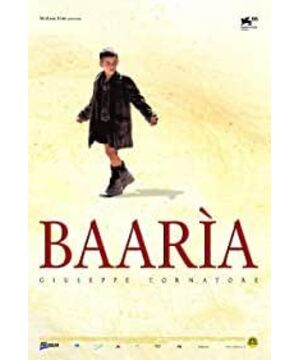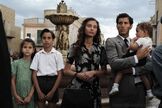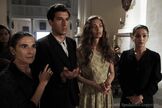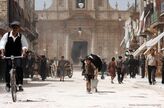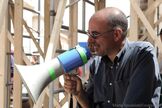At the beginning of the film, the strong Sicilian style came to the face. People with passion and unrestrained nature, talking with loud voices like quarrels, exaggerated expressions and body language...all of these, All accurately led the audience to that island in the Mediterranean.
Then, the little boy Pepe ran across the narrow and noisy streets, hurriedly crossing the disabled neighborhood, the aunt splashed water behind him, and the uncle was sifting food... So suddenly the audience seemed to revisit the director Giuseppe Toto. Nardore’s other two works "Paradise Cinema" and "The Beautiful Legend of Sicily". However, this time "Barria" is more self-seeking and ambitious. It takes two and a half hours to present the historical changes of a small town and a family, in which the current situation is staggered, the situation is strong, etc. The political elements of the drama make this drama different from the two above-mentioned atmospheres.
It can be said that this is a very personal movie. Baaria is the hometown of director Tonadore. It is the dialect of Bagheria, the largest city in the province of Palermo in Sicily, because I understand Because of love, the town’s streets in Tonadore’s lens are full of secular realism and life interest. “In Baaria, people’s lives follow a main road, within a few hundred meters. Everything can be seen clearly. Year after year, you can experience a world you will never understand.” It is
undeniable that Tonadore is a director with nostalgia and nostalgia. He has written the story of Sicily with light and shadow many times. This time he made a thorough tribute and worship to his birthplace. At the same time, the story of Sicily and a boy's growth is also his eternal theme. Pepe in "Baaria" is reminiscent of Toto in "Paradise Cinema", but Pepe's life trajectory is more complicated, because the film not only shows his growth, but also tells the story of three generations of his family. , And his political ambitions in the ups and downs of the Italian political climate in the middle of the last century. During the period, he also went to the former Soviet Union and France, and these experiences of leaving home promoted his spiritual growth and made him completely return to become a real Baaryian who regarded this place as his permanent soul.
Although the plot of the film is easy to generalize-the film takes the protagonist Pepino’s life trajectory from childhood to old as the main line, his father from the prime of life to death, the youngest son from the baby to the grown-up by the train to assist, gradually unfolded. The deputy long-length style paintings cover the historical changes of Sicily and even the whole of Italy from the 1930s to the end of World War II, and then to the development of political parties after the war for decades. However, the specific presentation of the film does not seem to be so concentrated and concise. It appears very scattered and wide-angle, as if to connect the bits and pieces of a person about the past sporadically. The bond that runs through it is feelings, and this feeling is also strong. As a result, some viewers were confused when they watched it, and they seem to be uncomfortable with the film’s excessive political factors and loose past events.
Indeed, the film’s political atmosphere is relatively strong, and non-Italians will be a little tired when watching that period of history. It is a great way to alternately stage the political turmoil at that time, from Mussolini’s dictatorship to the various changes after the end of World War II. , From the Christian Democrats to the Communist Party of Italy, various campaign struggles came to light one after another, and there were endless noises (part of the scenes are reminiscent of a rally in another Italian film "The Postman")... So, in the film When people are busy, the audience is also busy, busy digesting these people and things, as well as their relevance and influence on the protagonist’s life.
In such a complex historical background, the directors with complex are busy creating a big era, and also busy letting the "anecdotes" of various characters in their childhood memories appear interspersed, and busy letting the symbols of the times appear in the mirror at the right time, such as watching TV in an empty alley. I am also busy suggesting the future of the character. Therefore, the three-generation story of a family seems to be superficial, and it seems that there is no time to accept their specific emotional changes and personality fluctuations. As time changes, the children also "change" their appearances, and for a while they seem to have surprisingly many faces.
The sound effects of the film highlight the chaos and chaos of Sicily, but they are often too noisy, causing Tonadore’s old partner and soundtrack master Morricone (the two have worked on "Paradise Cinema", "Sea Pianist", "Sicily Beautiful" Legend") The soundtrack for the film is suspected of annihilating it. However, it is worthy of being a golden partner. Amidst the noise, Morricone’s soundtrack can still be heard full and nostalgic. In addition, in order to match the film’s past narrative style, the tunes seem scattered and loose, without a unified theme.
As the most expensive work in Italian film history, the film also has many big scenes, such as gatherings in the wilderness, people and flags full of mountains and plains. Apart from the large amount of political atmosphere, many scenes in the film still present the flavor of a realistic epic film, such as the riots in the cinema soon after the beginning, the religious parades in festivals and so on. And the scene where the teenager Pepe walks the cows on the street and delivers milk from door to door, which makes people sigh. This is the real "there is something rare, and whoever drinks it knows". This way of delivering milk not only ensures the freshness of the milk. , The milkman is not tired, because the "milk" is taken by himself. In addition, the scene of Pepino seeing off his youngest son Pietro at the station was quite nostalgic and sentimental. At first, Pepino seemed to smoke and walk away casually, but when the train turned on, he rushed and chased and called for the most Seeing off the beloved son.
As long as you are a little careful, it is not difficult to find that the film's mirroring is full of affection. Whether you look down at the town or gaze at the plains and mountains, you seem to express a lingering homesickness. At the end of the film, Tonadore asked the teenager Pepe to "a dream of yellow beams". He dreamed of his life. When he walked on the streets of Baaria, the street scene was the current scene, everything seemed like a lifetime, and he and the flying childhood Pepe passed by... So, his entire life trajectory seemed to have been intertwined in the time and space of Baaria, never leaving, no matter how time and the world changed, every part of him was every moment and every moment. Mind always stayed in this place he loved so much, just like Tonadore himself.
Many people miss their hometown and the place where they grew up when they were young. However, their hometown has long been completely different. In fact, what people miss most is the childhood that will never go back.
http://nicolew.blog.hexun.com/47004096_h.html
View more about Baaria reviews


